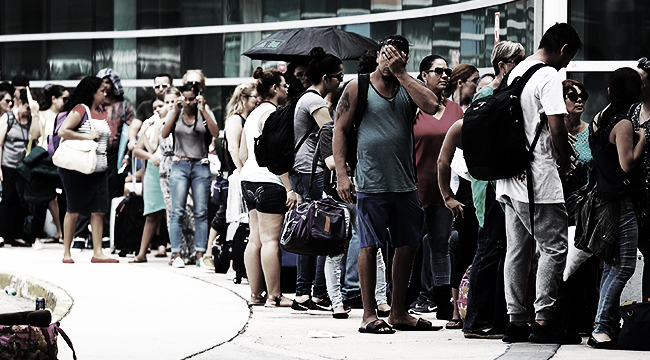
When he wasn’t preoccupied with how big the ocean surrounding Puerto Rico was, President Trump declared he would visit the U.S. territory next week. He also stated that his administration had “worked very, very hard” to ensure it was receiving adequate aid after Hurricane Maria, despite FEMA funding obstacles. “We’ve gotten A pluses on Texas and on Florida,” he told reporters on Tuesday. “And we will also on Puerto Rico.”
However, many are questioning the validity of Trump’s boasts regarding the ravaged U.S. territory — especially because of the so-called Jones Act and how it may hinder timely hurricane relief for Puerto Rico. But what does the Jones Act, otherwise known as the Merchant Marine Act of 1920, have to do with delivering necessary relief to the people of Puerto Rico?
- The nearly 100-year-old law regulates commerce in U.S. waters and between U.S. ports. Specifically, it requires all goods transported by water between American ports be accomplished by ships built in the U.S., mostly owned businesses or businessman, and manned by crews largely consisting of citizens or permanent residents. All aid shipped to Puerto Rico must adhere to the Jones Act, and those who violate it face severe financial penalties, regardless of the circumstances.
- The Trump administration waived the Jones Act for all hurricane relief shipped by water to Texas, Louisiana, and Florida. However, they have not done the same for Puerto Rico. While Trump bragged about his good work, Customs and Border Protection spokesperson Gregory Moore explained in a statement that there was a “sufficient capacity” of American ships bringing aid to the island. “The limitation is going to be port capacity to offload and transit, not vessel availability.” As a result, it seemed that Homeland Security would not be waiving the Jones Act in this instance.
- Yet the Jones Act has long been a point of contention between Puerto Rico and the U.S. It often results in doubled prices for basic commodities on the island throughout the year, and many experts worried this would affect the ability of residents to overcome the devastation of both Hurricane Irma and Hurricane Maria. Sen. John McCain (R-Arizona) agreed, as he urged DHS to waive the Jones Act for Puerto Rico on the same day Moore’s statement went public. Despite this, it seemed the law would remain in effect even as Puerto Rico suffered.
Come Wednesday morning, however, it seems repeated calls for a waiver are gaining steady support. From one of Trump’s most frequent targets, the “failing” New York Times, to the Rupert Murdoch-owned Wall Street Journal, several op-ed writers and editorial boards are criticizing the administration’s apparent refusal to waive the Jones Act for Puerto Rico. The WSJ even went so far as declare declare that “Puerto Ricans [are paying] dearly for this protectionism,” while contrasting Trump’s inaction with President Obama’s temporary stay on the law following Hurricane Sandy.
What’s more, DHS is now refuting previous claims it had denied requests to waive the Jones Act. Department spokesperson David Lapan insisted there were no official waiver requests pending with Customs and Border Protection, and that stories suggesting otherwise were “just not true.” Another DHS official acknowledged McCain’s statement and others from Congress, but they noted that this “is not a normal way that waiver requests come in.” Puerto Rico Governor Ricardo Rossello, meanwhile, told CNN that he hopes and expects the federal government to waive the Jones Act soon.
